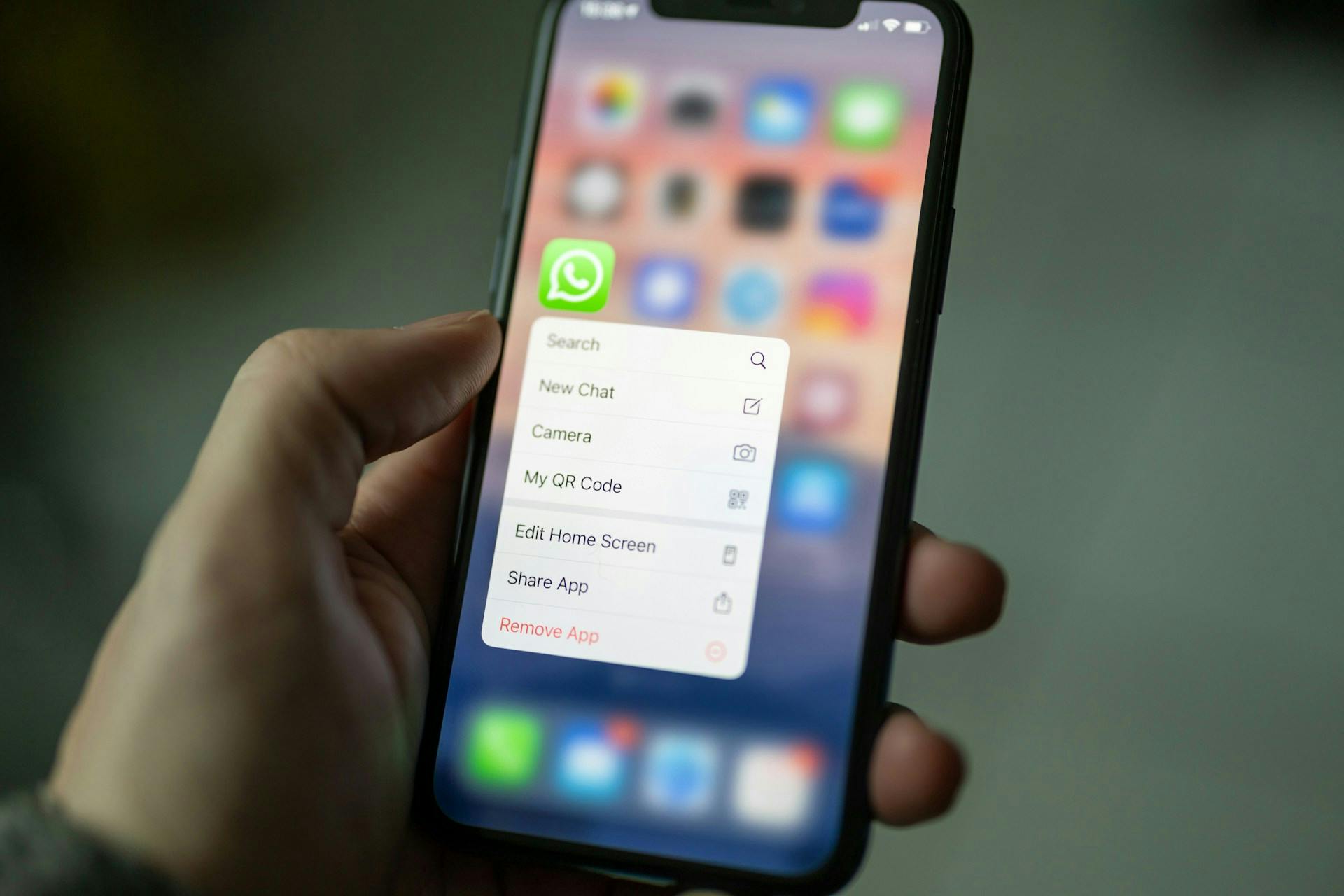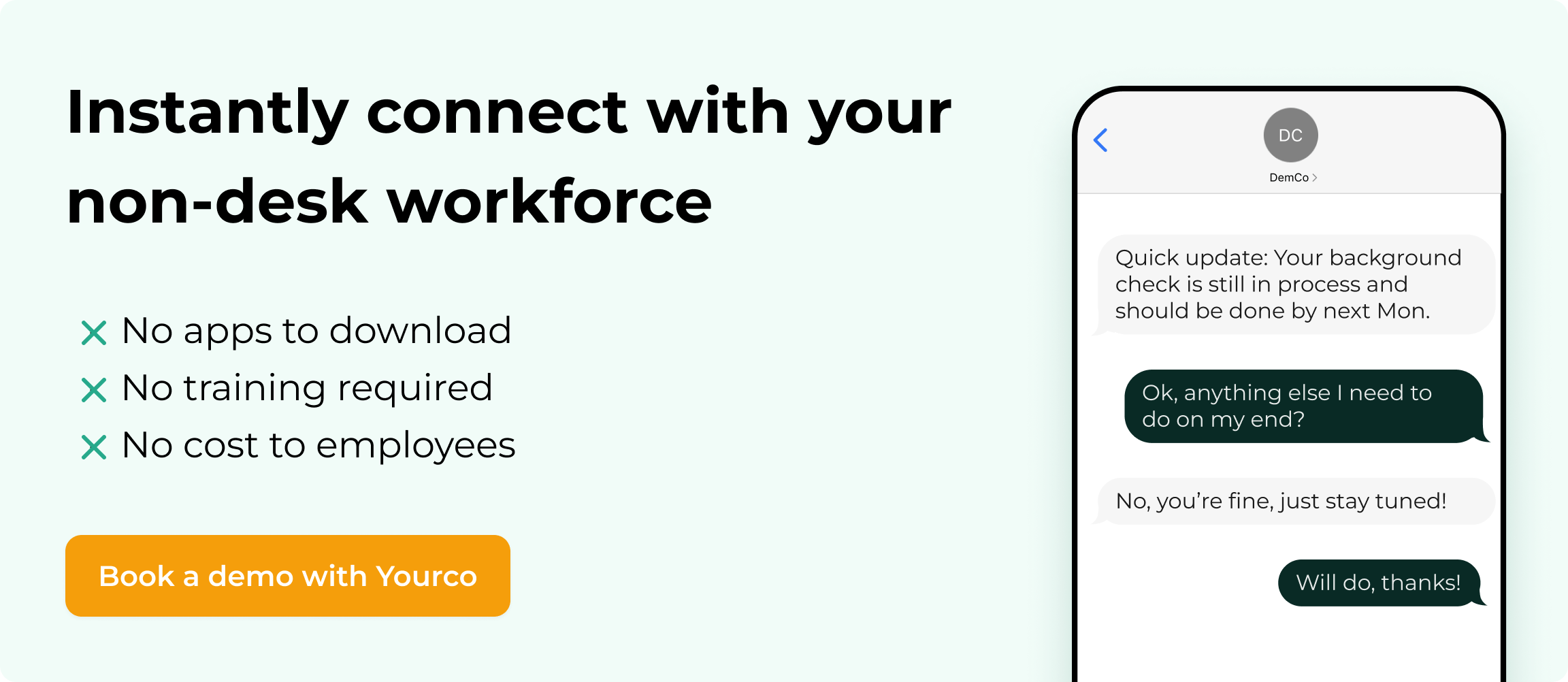Is WhatsApp the Right Fit for Your Company's Employee Communication Needs?


Most businesses struggle to connect with their non-desk employees, who represent approximately 80% of the global workforce. These frontline workers—manufacturing staff, retail associates, healthcare providers, and field technicians—rarely access company email or computers, leading to missed updates and frustration on both sides.
This gap has led many organizations toward familiar messaging platforms like WhatsApp for ease of use, but privacy concerns, compliance risks, and blurred work-life boundaries pose challenges.
While WhatsApp enables quick messaging, alternative solutions like SMS-based platforms often provide better security, control, and accessibility. Businesses looking for a reliable way to connect with frontline teams should explore communication tools designed specifically for non-desk employees.
Pros and Cons of WhatsApp for Employee Communication
WhatsApp is a widely used messaging platform, popular in personal and informal settings. However, when considering it as an internal communication tool for employees, particularly non-desk workers, it is important to thoroughly evaluate both its advantages and limitations.
Pros of Using WhatsApp:
- Widespread Usage: With over 2 billion global users, most employees are already familiar with WhatsApp, eliminating learning curves and speeding adoption.
- Multimedia Support: Allows easy sharing of text messages, images, videos, and voice notes, accommodating diverse communication needs.
- Instant Coordination: Real-time group chats can facilitate rapid discussions and quick updates within teams.
- Cross-Platform Functionality: Works seamlessly across Android, iOS, and desktop, ensuring broad accessibility.
Important Considerations for HR Teams:
- Data Ownership Issues: WhatsApp stores your organization's communication data on external servers, limiting your company's control over sensitive information. Messages are tied to employees' personal accounts, posing risks when individuals leave the organization.
- Audit and Compliance Challenges: The absence of built-in admin oversight and audit trails complicates compliance efforts, particularly for regulated industries. Lack of traceability for message viewing and sharing creates accountability risks.
- Group Communication Pitfalls: Important messages can easily get lost within group chat noise, leading to overlooked updates. Additionally, blending personal and professional communications in group chats can inadvertently foster misunderstandings or interpersonal conflicts—particularly in high-stress, fast-paced labour intensive environments where clear communication is essential.
- Employee Concerns: Employees may feel uncomfortable mixing personal and professional messages on the same platform, which can blur the lines between work and personal life.
- Lack of Administrative Controls: WhatsApp lacks advanced management features such as role-based access, message moderation, and integration with HR or payroll systems.
- Cost-Effectiveness: Utilizes internet data potentially adding communication costs for employees.
- Dependence on Internet Access: WhatsApp relies entirely on internet connectivity. Many frontline workers operate in environments where Wi-Fi or cellular data coverage is limited, unstable, or unavailable. Remote job sites, warehouse floors, and factory plants often have unreliable network coverage, making WhatsApp potentially unusable in critical situations.
Why SMS is the Preferred Communication Channel for Non-Desk Workers
While WhatsApp might serve well for personal use cases and informal interactions, SMS-based communication offers clear advantages tailored specifically to the needs of non-desk workers, such as those in manufacturing, logistics, construction, or warehousing.
Advantages of SMS for Non-Desk Workers:
- Reliable Connectivity: Unlike WhatsApp, SMS operates on cellular networks, which means it doesn't rely on internet or Wi-Fi. Workers can send and receive messages as long as they have cellular signal, even in remote locations or areas with weak connectivity.
- Device-Agnostic: SMS works universally on any mobile device, whether it’s a smartphone, basic mobile phone, or flip phone, ensuring comprehensive accessibility across the workforce.
- No Downloads Required: Employees do not need to install or manage any apps. SMS utilizes the phone’s default messaging application, simplifying the communication process and reducing barriers to adoption.
- Instant and Direct Communication: Messages sent via SMS are received directly in the recipient’s primary inbox, eliminating the possibility of important messages getting lost in group threads or overlooked within multiple apps.
- More Inclusive: SMS reaches every employee regardless of their technical literacy, device preference, or comfort with technology, ensuring consistent and effective communication across diverse teams.
- High Engagement Rates: SMS messages boast a 98% read rate, ensuring critical updates promptly reach employees.
Choosing SMS as a communication method ensures reliable, inclusive, and effective interaction with non-desk employees, while simultaneously maintaining compliance, data control, and clear professional boundaries.
WhatsApp Alternatives for Employee Communication
Looking for better ways to connect with your non-desk workers? Several purpose-built alternatives to WhatsApp offer major advantages over WhatsApp for employee communication. These specialized platforms provide features designed specifically for workplace communication with frontline employees.
Purpose-Built Employee Communication Platforms
Yourco stands out as a powerful SMS-based employee communication app that doesn't need app downloads or logins. Using the familiar text messaging interface, Yourco connects non-desk workers without technical barriers, enhancing non-desk employee communication. The platform offers:
- Two-way texting for direct communication between management and employees
- Company-wide announcements for critical information
- Secure conversation storage with searchable history for compliance
- Automatic language translation supporting diverse, multilingual workforces
- Built-in polling and surveys to gather employee feedback and strengthen engagement
- Enterprise-grade security features, including data encryption, multi-tenant databases, and customizable admin access controls
Bonusly encourages employee engagement through recognition and rewards. Its key features include:
- Peer-to-peer recognition for boosting morale
- Integration with popular workplace tools
- Analytics and reporting to measure employee satisfaction and engagement
Nectar is another employee recognition platform designed to foster a positive workplace culture through:
- Recognition and rewards systems
- Employee feedback and pulse surveys
- Detailed analytics for understanding team engagement and performance
Hybrid Communication Approaches
For organizations with both desk and non-desk workers, platforms that bridge these environments offer value.
Staffbase combines employee communication with intranet solutions to create a unified system:
- News feed with targeted communications
- Employee directory for easy connections
- Messaging functionality
- Event management and document sharing
A healthcare provider with 5,000 employees achieved a 65% adoption rate of the Staffbase app within the first month, significantly improving information flow to their frontline workers.
Microsoft Teams offers comprehensive communication tools that can work for mixed workforces, though non-desk workers might find it less intuitive:
- Chat and messaging capabilities
- Video conferencing for remote teams
- File sharing and collaboration tools
- Extensive integration with Microsoft 365 and third-party apps
These alternatives offer several advantages over WhatsApp:
- Clear separation between work and personal communication
- Enhanced security and administrative controls
- Purpose-built features for workplace communication
- Better integration with other business systems
- Improved analytics for measuring engagement
Strategies for deskless worker communication include considering ease of use, mobile accessibility, integration capabilities, and whether employees need to download apps or create accounts. For many organizations, SMS-based solutions like Yourco provide the lowest barrier to entry while ensuring messages actually reach and engage your frontline teams.
Case Studies: WhatsApp in Employee Communication
For larger organizations, especially in regulated industries, WhatsApp implementations have faced major problems.
In 2018, German automotive company Continental AG banned WhatsApp from an estimated 36,000 company devices due to serious information security concerns. They determined that the risks to sensitive data outweighed the convenience.
Even more troubling is JPMorgan Chase, which was fined $200 million when employees used WhatsApp and other unauthorized messaging apps for business communications. This highlighted the severe consequences of non-compliance in the financial sector.
These examples show enterprise challenges with WhatsApp:
- Lack of centralized control and oversight
- Difficulty meeting industry compliance requirements
- Problems with data privacy and security
- Issues with auditability and recordkeeping
Text Messaging: The Smart Choice for Frontline Workers
SMS is a reliable way to reach non-desk employees without requiring smartphones, data plans, or app downloads. Unlike WhatsApp, it keeps work messages separate from personal ones while ensuring important updates—like schedule changes or safety alerts—are seen quickly.
Yourco enhances SMS communication with two-way messaging, automatic translations, and searchable conversation history, making it easy for management to connect with frontline teams. Whether in manufacturing, retail, or healthcare, employees get the information they need, wherever they are, without extra steps—no downloads, no accounts, just simple, effective communication.
Try Yourco for free today or schedule a demo and see the difference the right workplace communication solution can make in your company.



